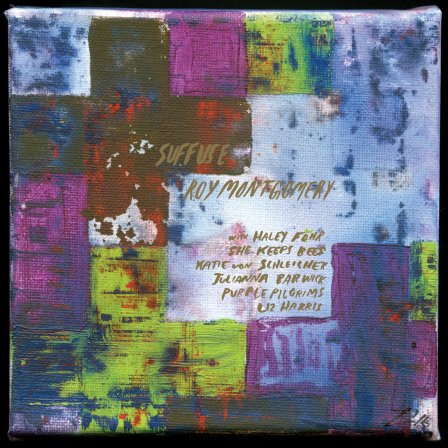Roy Montgomery’s music has a rarified aura that distinguishes him among the crowded field of fellow New Zealand experimentalists who came to prominence in the 1980s and 90s. His use of layering and yawning reverb approximates immensity while still sounding secluded and hushed. He is also one of the few guitarists of that milieu who has gracefully straddled the divide between melodic songwriting and pure atmospheric, evoking both distance and emotional intensity, as if his songs were just out of reach, barely being wrested from the ether. While his work in The Pin Group helped define the classic Flying Nun sound, he has since shed much of the jangle at the core of that band (and his work with Dadamah) in favor of free-flowing shimmer, providing a template that artists like Grouper, Jefre Cantu-Ledesma, and Ilyas Ahmed would explore a decade and a half later.
Montgomery’s lasting influence on younger musicians, as well as his expert command of exploratory songwriting, factor heavily on his new album Suffuse. Apparently disenchanted with his own singing, he recruited six women to take over vocal duties. As someone for whom Montgomery’s voice can be an occasional stumbling block, it’s refreshing to hear his songs performed with such broad stylistic range. While the music is still very much in Montgomery’s soundworld — his distinctive guitar playing and method of writing songs that spiral in on themselves are still the central elements — each singer imbues the songs with their own distinct character while contributing to an overall effect of the album unravelling, becoming more intangible as it progresses.
Suffuse opens on its most dramatic note. Sudden dissonance immediately envelops the sonic landscape on “Apparition,” which features Haley Fohr of Circuit des Yeux. Fohr’s tonal range is most similar to Montgomery’s, though her delivery is characteristically expressive, bordering on explosive — quite a departure from Montgomery’s typical monotone. Fohr is a powerhouse singer, intoning Montgomery’s words as if they’re her own, letting the repeated melodic line intensify with each cycle. Waves of guitar create a forcefully meditative quality, tense and uneasy but strangely serene. It’s a standout moment on the album and as novel a song as Montgomery has written.
“Rainbird,” and “Outsider Love Ballad No. 1,” featuring She Keeps Bees and Katie Von Schleicher respectively, feature similarly cyclical melodies but are carved into more traditional structures. For all of their ruminant atmosphere, they are approachable as songs, with lyrics front and center. “Outsider Love Ballad No. 1” is an intimate post-breakup meltdown, and Von Schleicher sings it with an anxious tension that contrasts starkly with the sheets of guitar echoing around her voice. As it reaches its halfway point, the song slips into more impressionistic territories, offering a bridge to the album’s second side of astral explorations.
Each track that comprises the second side of Suffuse slips further away from anything resembling a traditional song. Montgomery’s collaborators, known for their dreamier, more searching material, bring that spirit to bear here, accentuating Montgomery’s predilection for eternally expansive music. “Sigma Octantis,” which sees Julianna Barwick on vocals, feels weightless, with almost no bass present in the mix, stretching out to eight minutes of ever-expanding vocal layers. But it is “Landfall,” featuring Liz Harris, whose Grouper project is the most directly influenced by Montgomery’s work of anyone featured here, that feels like the most natural collaboration on the record. (They have a history of releasing music together, and Harris has released several of Montgomery’s records on her own Yellow Electric label.) Here, Harris’s voice is obscured by just as much reverb as Montgomery’s guitars, allowing the music to wash over us. As Montgomery hits the fuzz pedal halfway through the song, he absorbs Harris, letting her intonations completely mesh with his guitar. They proceed as if they were one entity, fully integrated and spectrally fused.
Taken individually, each track on Suffuse works well as its own collaboration between a respected innovator and a younger singer influenced by his unique approach. But the real magic of the album, and what makes it the most engaging he’s released since his nine-year hiatus ended in 2010, is the way it flows from heady fervor to apparitional beauty. Each song feels like a stepping stone toward melancholic acceptance, a letting go of pressure in lieu of something both more abstract and peaceful. It is a pleasure to melt along with it.
More about: Circuit Dex Yeux, Dadamah, Dissolve, Grouper, Haley Fohr, Julianna Barwick, Katie Von Schleicher, Liz Harris, Roy Montgomery, She Keeps Bees, The Pin Group




